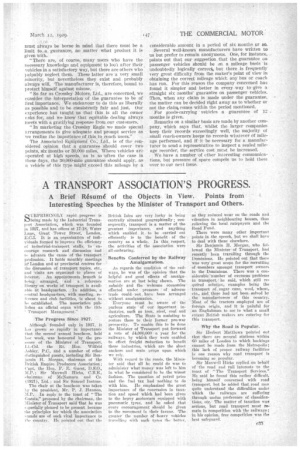A TRANSPORT ASSOCIATION'S PROGRESS.
Page 65

If you've noticed an error in this article please click here to report it so we can fix it.
A Brief Résumé of the Objects in View. Points from Interesting Speeches by the Minister of Transport and Others.
SURPRISINGLY rapid progress is being made by the Industrial Transport Association, which was founded in 1927, and has effices at 17-18, Water Lane, Great • Tower Street, London, E.C.3. It is an organization of individuals formed to improve the efficiency of industrial-transport staffs, to encourage research research 'and discussion and to advance the cause of the transport profession: It holds monthly meetings lir London and at provincial centres for the discussion of transport topics, etc., and visits are organized to places of interest. An appointments branch is being arranged; and a reference library on Works Of transport ia
available fit headquarters. . In addition, a ventral headquarters,. with meeting, reference and club -facilities, is about to he established. The association publishes an official organ with the title ' Transport Management."
The Progress Since 1927.
Although founded only in 1927, it leis grown so rapidly in importance that the s.econd annual luncheon, held hist week, was honoured by the presence of the Minister of Transport, Bt.-Col. the Rt. Hon. Wilfrid Ashley, P.O., and a Lumber of other distinguished guests, including Sir Benjamin H. Morgan, chairman of the British Empire Producers Association; caul:. the Hon. F. E. Guest, D.50., M.P.; Sir Maxwell Hicks, C.B.E., rhairman of .McNamara and Co. (1921), Ltd. ; and Sir Samuel Instone.
The chair at the luncheon was taken by the president, Mr. P. J. Hannon, M.P. In reply to the toast of "The Guests," proposed by the chairman, the Minister of Transport said that he was t,tpecially pleased to be present because the principles for which the associatitin tends are of such vital importance to lie country. ire pointed out that the
British Isles are very lucky in being centrally situated geographically ; con80(111e/illy, transport is a matter of the greatest importance, and anything which enabled. it . to be carried out efficiently is to the benefit of the country as a whole.. In this respect, the activities of the association were all-embracing.
Benefits Conferred by the Railway' . Amalgamation.
As regards the conditioh of the railways, he was of the opinion that the helpfuland good effects of amalgamation are at 'last being shown. The subsidy and the welcome : economies' effected under pressure • of adverse• trade could not. have been arranged without amalgamation.
Everyone mink be aware of the* parlous state of our important industries, such as iron, steel, coal arid agriculture. The State is assisting to restore these to their former pre-war prosperity: To enable this to be done the Minister of Transport put forward a' vote of 14,000,000 a year for the railways, by which they were enabled to effect freight reduction to benefit these industries, which are the sheet anchors and main props upon which we rely.
With rezard to the roads. the Minister said that all he could do was to administer what money was left to him in what he considered to be the wisest fashion. The question of petrol price and the fuel tax had nothing to do with him. He emphasized the great importance of the concession in taxation and speed which had been given to the heavy motorcars equipped with pneumatic tyres, and he asked that every encouragement should be given to the movement in their favour. The greater' the number of -heavy vehicles travelliug with such tyres the better, as they reduced wear on the roads and vibration in neighbouring houses, thus relieving the local ratepayers and the Road Fund.
There were many other important points in the speech, but we shall have to deal with these elsewhere.
Sir Benjamin H. Morgan, who followed the Minister, -of Transport, had recently. been travelling through tbe Dominions. He pointed out that there was very' great scope for the recruiting of 'members amongst transport owners in the' Dominions. There was a coilsiderable'•Ltimber of overseas problems in transport, he said, which still required • solution, examples being the transport of _sugar cane wool, wheat,
etc.. and these had not beensolved by the 'manufacturers of this country. Most of' the tractors employed are of foreign origin, and it is painful for an Englishman to see to what a small extent British makers are catering for this transport.
• Why the Road is Popular.
Sir Herbert Matthews pointed out that there are several stations within 60 miles of London to which bookings cannot be made from the Metropolis; this lack of proper railway facilities is one reason why road transport is beComing so popular.
Sir Maxwell Hicks replied on behalf of the road Slid rail interests to the toast of "The Transport Services." He said he found this rather difficult, being himself concerned with road transport, but he added that road men quite understand .the difficulties under which the railways are suffering through undue preference of classifications, etc. The matter of taxation was serious, but road transport must remain in 'competition with the railways; in his opinion, free competition was the best safeguard.




























































































































